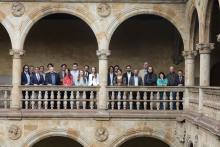Legal Survivals and Global Legal Pluralism
Coordinators: Rafał Mańko (Central European University, Democracy Institute), Ewa Górska (Digital Justice Center. Faculty of Law, Administration, and Economics. University of Wroclaw), Piotr Eckhardt (Ignatianum University in Cracow)
Description of the meeting
- Rationale. The goal of the workshop is to analyse how legal institutions that were introduced in former colonies, dominated/occupied countries or were in force in federations (e.g. USSR, Yugoslavia) that have remained after decolonisation, the breakup of federations or empires, or end of domination or occupation, have continued to function after the relevant political transformation. To this end, we intend to use the notion of a “legal survival” (Mańko 2023), developed with reference to Karl Renner’s analyses of the change of social function of a legal institution despite the continuity of its legal form. By looking at at concrete examples of legal survivals, we hope to find answers to such questions, as: (1) why do newly independent countries decide to keep some parts of imperial/colonial/federal law, but abolish other parts? are the reasons purely pragmatic? how is it decided to keep some but abrogate other institutions/codes/rules? (2) how do lawyers (including judges) approach such legal institutions? are legal survivals subject to a reinterpretation? if so, what kind of interpretive techniques are used, e.g. axiological or constitutional arguments? (3) how do legal survivals interact with earlier law (prior to colonization/domination) and later law (enacted after independence)? does the presence of legal survivals contribute to the emergence of a patchwork, incoherent system, or are these interactions smooth? (4) what are the symbolic, cultural and ideological ramifications of legal survivals? are they present in the public discourse, subject to a critique by politicians, or rather treated as an axiologically neutral, technical legal device?
- Thematic scope. The workshop will focus on legal survivals in various settings in terms of space, time and subject-matter. The idea is to look for common patterns across different epochs, jurisdictions and contexts, and cover both legal survivals of former empires (e.g. in the colonial context), former federations (USSR, Yugoslavia), but also legal survivals that endured outside those contexts (e.g. feudal legal survivals).
- Structure. The workshop will kick off with a methodological paper by Mańko, with sociologist of law Górska and legal historian Cercel acting as discussants, followed by a common methodological discussion. Following that, the first four panels will be grouped according to regional specificities (post-Soviet legal survivals; post-colonial legal survivals; legal survivals in Common Law and mixed jurisdictions; legal survivals in the Balkans). The last two panels will be arranged according to area of law (legal survivals in constitutional law; land law and housing law).
Our experience in Oñati
The Oñati International Institute for the Sociology of Law is an excellent venue for organising a pluridisciplinary scientific workshop on law, which includes a socio-legal component. Our workshop on ‘Legal Survivals and Global Legal Pluralism’ brought together sociologists of law, legal historians, philosophers of law, and comparative lawyers to discuss how to account for the continuity of legal institutions, concepts, principles and rules (in short: legal forms) that have originated in an earlier historical epoch and yet have endured following a transformation, transition or even revolution. The scientific atmosphere of the Institute – located in the 16th century venue of the Holy Spirit University – proved to be conducive to a productive exchange of perspectives shared by scholars coming from all major theoretical disciplines of legal science. The administrative staff of the Institute have been extremely helpful all along the way, from the moment of acceptance of our workshop proposal until now, when we are working on post-workshop publications. The distinct formula of the Oñati workshop, with 25 papers distributed over nine intensive sessions, provided an optimal space for scientific debate. Whereas each of the participants brought with him- or herself a distinct theoretical perspective juxtaposed on different historical or contemporary examples, we managed to focus in our heated discussions on the concept and theory of legal survivals, and the most adequate methodology of studying them. We hope that the newly proposed concept of a legal survival will become a useful tool for the empirical study of legal cultures, especially in the context of post-imperial, post-colonial and any other post-transition societies.
Workshop Coordination Team
Avenida de la Universidad, 8
Apartado 28
20560 Oñati (Gipuzkoa) - Spain
T: +34 943 78... Ver teléfono
E: workshop@iisj.es




